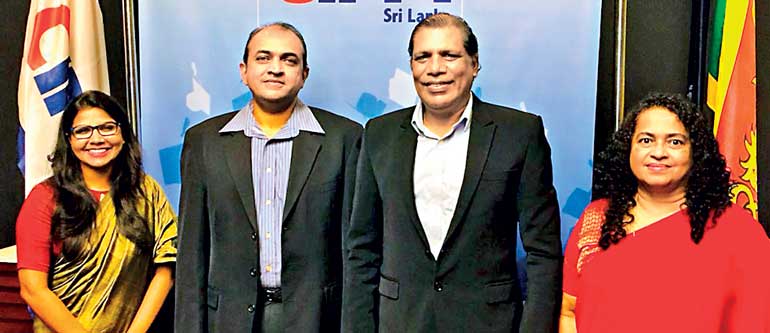Wednesday Feb 18, 2026
Wednesday Feb 18, 2026
Tuesday, 1 February 2022 01:07 - - {{hitsCtrl.values.hits}}

From left: Davina Kern, Dr. Thivanka Munasinghe, Ken Vijayakumar and Dr. Heather Fernando
CIPM Sri Lanka recently organised a bilingual webinar to share expert insights on “Managing Employee Wellbeing for High Performance in the Workplace” attracting over 200 enthusiastic participants.
The expert speaker panel comprised of David Pieris Holdings Head of Group HR Davina Kern, Family Physician Dr. Thivanka Munasinghe and Metropolitan Technologies AGM HR Dr. Heather Fernando. It was moderated by CIPM Sri Lanka Vice President Ken Vijayakumar who is also Director HR, Waters Edge.
“In the context of the far-reaching effects of the pandemic, there is no doubt that employee wellbeing was affected. HR practitioners should take the lead to ensure that the enabling environment for employee high performance and engagement is maintained with innovative, out of the box thinking to care for their employees’ wellbeing thereby overcoming the challenges in the new normal,” said Vijayakumar.
At the outset, the panellists presented their views on many interesting and important areas including the definition of employee wellbeing in the context of HRM, importance of employee wellbeing for HR practitioners and professionals, best practices for employee wellbeing adopted by organisations during the pandemic, how employee wellbeing adds value to organisational performance and future strategies that can be adopted for employee wellbeing.
Explaining that employee wellbeing is the way employees’ work, with their expectations, with workplace effects on their overall health and happiness, Dr. Munasinghe said that the state of being comfortable with good health was dependent on the employees emotional, career, social, financial, and physical status which are known as the 5 pillars of wellbeing. “By understanding and listening to our employees we can improve their happiness and the sense of wellbeing. Eventually, they will give an improved and increased productivity for the organisation,” he added.
Sharing her views, Dr. Fernando said that employee wellbeing is a state of psychological element that is shaped by engagement, their work expectations, and how their overall health and happiness is managed by the employer. “HR professionals should strategically leverage on-site resources to generate a healthier and happier workforce that contributes with high productivity for high profitability. Human capital is the heart of a successful organisation specially in tough economic times. Therefore, having a happy and healthy workforce could bring high economic values to the bottom line” she said, adding that during these unfamiliar times there is no doubt that employee wellbeing is a growing concern.
Kern said, “Everyone feared the deadly COVID-19. All employees needed an understanding setting to perform. Bosses, colleagues who are accommodative, who are there in need. COVID-19 took a toll on mental wellbeing of everyone. HR needs to be able to decide which task to be assigned to whom based on competencies. Companies who understood what really mattered to them focused on priorities and won people, customers and revenue,” and emphasised that post-pandemic it was important for HR to take a leadership role to help employees reconnect in an environment of coming back to office and supporting them to work remotely in terms of improving competencies required.